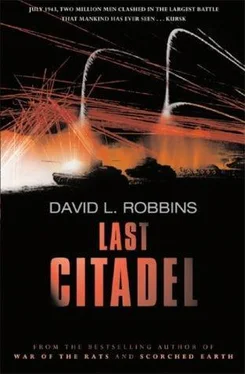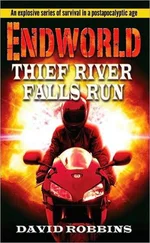‘Radio. Stay tight. Keep alert.’
‘ Ja .’ Luis listened in while the radioman repeated his command to the company.
‘Balthasar.’
‘ Fertig .’ Ready.
Two hundred meters ahead, the grainfields wrinkled into a lip, disguising a gradual downward slant. Luis stood in his Tiger’s cupola and surveyed the coming terrain. An hour ago a regiment of fifteen hundred grenadiers had begun their assault over this rise and into the valley below. Right away, they’d encountered strong Soviet infantry defending the ridgeline. After thirty minutes of fierce exchange, the Reds were shoved back. Luis’s panzer regiment was called in to support the grenadiers’ advance through the basin. If this valley could be taken, it would open a western attack lane directly to Prokhorovka, only two kilometers away. Leibstandarte threw all its tanks into this thrust.
The sounds of small-arms fire sprouted from the hidden valley. Luis and the panzer regiment came carefully up to the ridgeline, sixty-seven cannons pointing and trigger ready. The strength of the Russian defenders beyond the slope was unknown. Every tank slowed, every driver stole up to the rim to peer into the bowl.
The first Mark IVs reached the ridge, climbed, then slipped over the edge. Luis watched them cleave paths into shrubs and twisty branches, then sink slowly away down the slope. The first tanks of his own platoon passed the ledge, rose as though coasting over the swell of a wave, then tilted downward. His Tiger was next. The whine of his cannon elevating caught his attention, he watched the long barrel lift. Balthasar was clever; the gunner was not going to head down a slope with his weapon depressed. He wanted the gun up where he could defend the rest of the ridgeline above their heads.
The Tiger came to the ledge. The valley below was squarish, not deeply carved but broad. It opened west, draining down to the Psel. Two villages lined the riverbank there, Prelestnoe and Petrovka -the map room was always in Luis’s head. The slopes to the north and east leading into the valley were just like the one he was about to descend, all three were weedy and untended. But sprawling over the valley floor, filling it from the river villages to the foot of the bordering slopes, was an immense sea of bright, blossomed sunflowers. The valley walls cupped the gold like hands cradling a gigantic, shining medallion.
Luis gazed in wonder at the vast field of yellow. He did not forget this would be a battleground. But the omen was clear to him, the metaphor of the golden badge too plain to be ignored. His knife hand throbbed, he extended it behind the long, reaching cannon, as if to seize the prize.
The roar of a plane engine split the mists overhead. Luis dropped his hand and his imaginings and ducked into the cupola. He’d forgotten about the air battle raging on the other side of the smoke from artillery and the burning fields, the sounds of the dogfights were smothered on the ground by the rattle of moving armor.
Wings sliced out of the haze. The plane was a German scout flying parallel to the Leibstandarte line advancing into the valley. Small canisters tumbled out of an open window in the cockpit. The cans hit the ground and a great froth of purple smoke spewed from each all along the ridgeline.
This was the warning signal for tanks.
Luis looked left across the valley, to the river. He snatched his head around to the right, toward the railroad mound and road. Walls of violet smoke wafted everywhere.
The Reds. Remarkably, the Russians had chosen this moment to start a massive armored offensive. They’d picked the same time to attack, and the same ground, as the SS.
Luis stared into the purple cloak floating on the slope before him. He could not see through it into his yellow valley. The blowing, reddish billows made him angry. Had they taught the Russians nothing, were the Soviets this stupid to come in their Asiatic numbers again and again to be cuffed and killed every time? Luis hadn’t noticed but his Tiger had come to a stop. The rest of the panzer regiment was halted, as well. The scout plane powered away to the east, all his canisters puffing on the ground. The plane’s engine faded and was replaced by the zings and pops of small-arms fire in the valley.
Luis chafed in his hatch, waiting for the order to proceed down the slope. The purple smoke did not seem to thin, it waved in their faces and stymied them. The volleys of gunfire thickened in the valley behind the curtain.
‘Driver,’ he said.
‘Ja.’
‘Forward.’
The Tiger was the first to move into the vapor. In seconds the other tanks in Luis’s company were no longer mesmerized, they lurched, keeping formation. Behind his company the rest of the regiment shivered alive to creak down the incline. Luis had moved on, piercing the color and stink of the canisters ahead of the others.
‘Balthasar.’
‘Fertig.’
The purple fumes parted, whipped by a breeze flitting off the river. Through fissures in the smoke, Luis caught strains of gold. His Tiger pushed on and downward. Then, with a suddenness that surprised him, the smoke was whipped away.
On all sides, his company rolled out of the shroud, emerging onto the slope above the immense sunflower field. The tall flowers seemed to reflect their blazing color onto the battle mists and the smoke drifting overhead. Luis recalled the childhood game of holding buttercups under his friends’ chins, to see if they liked butter. Luis cast his eyes to the right, at the easternmost slope where the sounds of small-arms fire erupted. The Red infantry regiment and the grenadiers were locked in their own battle there. The sunflower field beckoned, as it had done since he arrived in Russia.
He shook his head.
‘Trap,’ he muttered.
He raised his right arm high, and at the same time gave the order to the driver, then the radio, to halt. The command went out to the rest of the company, then was taken up by the other tanks of the regiment. The grating of treads ceased all along the slope. The flowers stood two hundred meters away, their heads turned east to the sun and the carnage.
Luis looked to the west, to the flatland stemming from the river.
It took him a moment to find them across the bright corner of the sunflowers, the petals so infected the light, but there they were: the first stab from the Soviet offensive into this nodding yellow valley. Three dozen T-34s, maybe more, flowed out of cover from the two villages on the riverbank. They’d been lagered among the buildings, out of sight, planning to hit the Germans in the flank the moment the panzers crossed into the field. Luis’s regiment would never have been able to turn fast enough into the assault. The T-34s were intended to hit hard and fast at the vulnerable sides of the Tigers and Mark IVs. There would have been chaos and destruction in the sunflowers, if Luis had not stopped on the slope.
His tanks retained enough of the high ground to have an advantage over the rushing Reds. Had the Russians timed their move better, had they held off another minute until Luis became lulled or impatient enough to enter the valley, their strategy would have worked, the wound would have been deep. But now Luis brought Balthasar to bear. Along the slope, the other gunners turned also to meet the attack.
‘Range.’
‘Eighteen hundred fifty meters. Closing.’
‘At will, gunner.’
Luis no longer specified which shells or targets to choose. The gunner and his loader knew when to use AP or high-explosive rounds. And Balthasar had an uncanny knack for identifying which of the Soviet tanks was the boldest.
Balthasar fired; the fifteen Mark IVs in his company followed. The rest of the regiment opened up. The collective roar was enormous! In one heartbeat the first rank of T-34s took the hits. A dozen of the sixty-seven rounds fired in the opening salvo found their marks. The field geysered on all sides of the rushing Reds. More than a kilometer away, Luis saw two Soviet turrets catapult into the air on jets of steam, going off like teakettles, their ammo lit up from the intense heat of the shells piercing their compartments. The Russians did not veer from the battering but pressed through the edge of the sunflowers, wheeling into the killing range of the handful of Tigers on the slope and inevitably into the reach of the Mark IVs’ smaller cannons. Inside a minute every Leibstandarte tank was blasting away at the T-34s. So much smoke issued from the barrage it became hard to pick the T-34s out of the sunflowers up to their fenders. The Red armor was swift, cutting through the flowers like razors shaving the long stalks down. They did not stop, rolling inside a thousand meters, then eight hundred meters, close-quarters fighting for tanks. The Russians charged to get inside their own killing distance, no matter the cost they paid to the SS guns raging away above their heads. The corner of the golden field they stormed across was marred again and again under raining shells and the cremation of metal and man. Luis stood in his hatch and marveled at the Russians, not for the first time, but he felt, finally, watching this unreasoning rush into his blazing cannons, that he fully understood them. They were unfeeling to fear, remorseless to loss. They were brutes, truly. Do they feel nothing of their own danger? How can they run at my cannons? Don’t they know what I will do to them the closer they come?
Читать дальше












